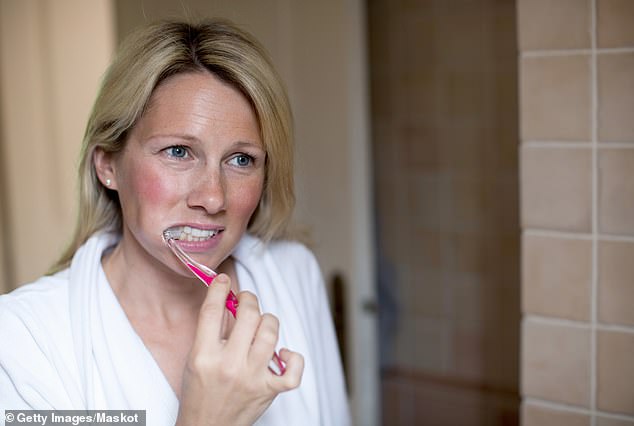Hot flashes and night sweats are well-known problems of menopause, but now dentists say women can also face problems with their teeth.
The drop in estrogen levels caused by menopause can cause a decrease in saliva production, leading to dry mouth.
This can lead to bacteria growth, which causes bad breath and increases the risk of cavities.
Menopause also causes a decrease in bone density, including in the sockets that support the teeth, which in rare cases can cause them to loosen.
A dentist has revealed a side effect of menopause that they say is little known. In many cases, women tend to link it to other factors (stock)
At the same time, dentists also say that aging naturally causes gum recession, which can expose areas of teeth that are not protected by enamel.
Dr. Thomas Sollecito, chief of oral medicine at the University of Pennsylvania, said Associated Press: “I’m not sure people are aware of this.
“As you can imagine, this could all get out of hand.”
Dr. Sally Cram, a periodontist in Washington DC, added: “The bottom line is that most oral conditions and problems during menopause are completely preventable (by paying attention to your teeth).”
Surveys suggest that approximately 50 percent of women experience dry mouth during menopause.
But most likely attribute this to other factors, such as not drinking enough water, rather than a biological change.
Menopause is a natural biological process that marks the end of a woman’s menstrual cycles and fertility, and generally occurs between the ages of 45 and 55.
Signs include irregular periods, hot flashes, and mood swings that cause irritability, anxiety, or depression.
Women going through menopause may also experience vaginal dryness, sleep disturbances, weight gain, and changes in skin or hair color.
Dry mouth is also a potential symptom.
Treatment options include hormone therapy and lifestyle changes, such as limiting saturated fats and eating more fruits and vegetables.
To prevent tooth damage due to dry mouth caused by menopause, dentists recommend good oral hygiene and nutrition as the first line of defense.
This means eating a balanced diet, low in sugars and high in calcium-rich foods, and brushing your teeth carefully using fluoride toothpaste and an electric toothbrush at least twice a day.
Dr Cram added: ‘An electric toothbrush may be more helpful than manual brushing.
‘Visit your dentist regularly and ask: Am I doing a good job? And if not, what could help me do better?’
Experts also suggested staying hydrated to avoid dry mouth, noting that an adult woman needs to drink about 11 and a half cups of water per day, or 2.7 liters.
Over-the-counter dry mouth sprays, lozenges, or rinses can also be used to counteract the side effect.


